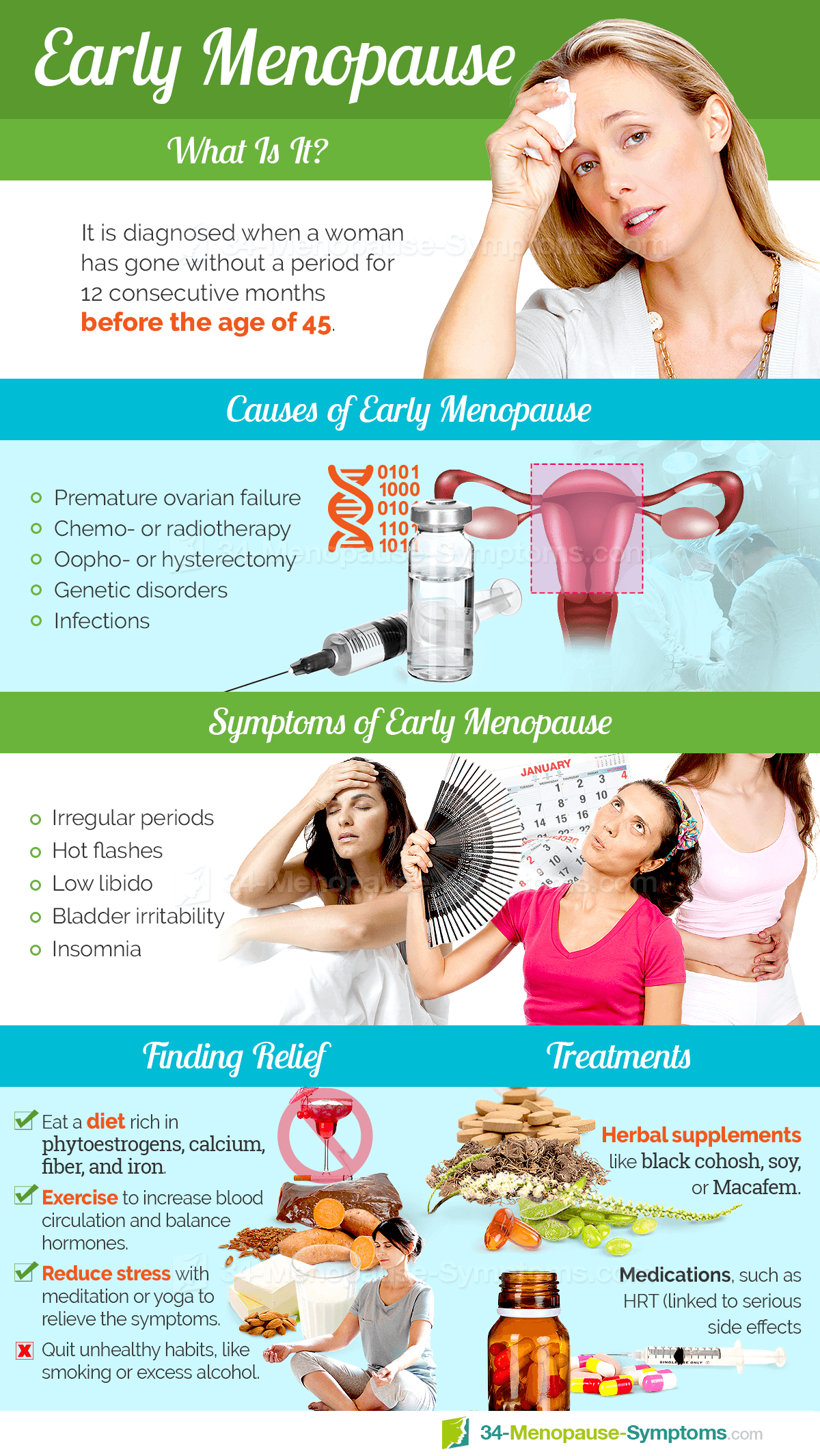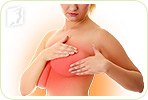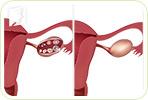Menopause is a natural transition every woman will eventually experience. For most women, menopause typically occurs in their 40s or 50s. For some women, however, this change can occur much earlier. Because this transition happens much sooner than many anticipate, early menopause can be difficult. Fortunately, there are resources to help women better cope with the changes they are experiencing.
Unfortunately, many young women have to deal with the onset of early menopause, its symptoms, and the physiological and emotional consequences.
Learn more about early onset menopause, its causes, its symptoms, and the different treatment options available for decreasing symptom severity.
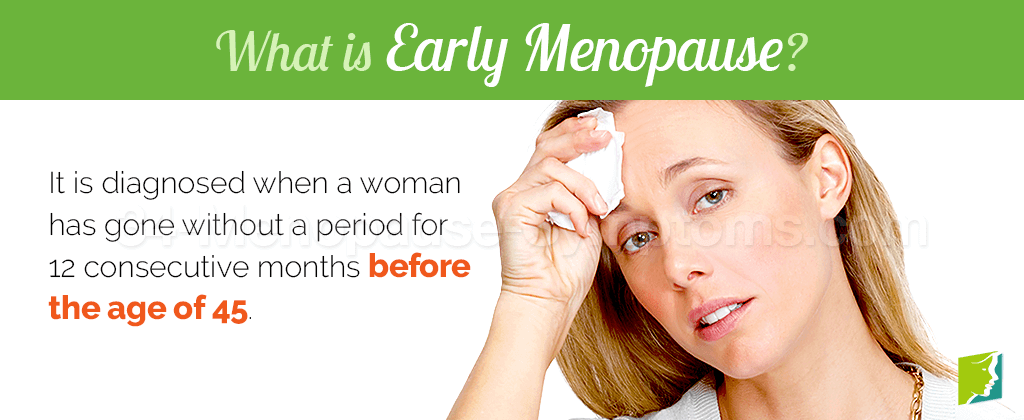
About Early Menopause
What is early menopause?
Early menopause is the unexpected beginning of menopause at a young age, specifically before women reach 40 years old.
While the terms early menopause and premature menopause are often used interchangeably, there is a distinct difference between the two. Affecting up to 4% of American women, early menopause is diagnosed when the menopause transition takes place before a woman is 45 years old. However, when the onset of menopause happens before their 40s, it is considered premature menopause. Premature menopause can even happen when women are in their teens or 20's.
Even though early menopause is sometimes confused with premenopause, the latter is completely different. Premenopause refers to a woman's fertile years, from her first period until she starts experiencing perimenopause symptoms.
If the signs of early menopause have been detected, there are some common tests that can be performed; these include a pregnancy test, thyroid disease test, estradiol level test, and follicle stimulating hormone (FSH) test.
Click the following link to learn more about early menopause, or keep reading for more details about the symptoms and causes of early menopause.
Early Menopause Causes
While pinpointing its exact causes are complex, there are some natural and medical factors that trigger the onset of early menopause.
Natural causes of early menopause
- Premature ovarian failure (POF). Also known as premature menopause, POF is diagnosed when a woman body's stops releasing eggs and ceases hormone production in the ovaries. It can be the result of many factors, from genetic predisposition to autoimmune disorders.
Medical causes of early menopause
- Infection. Certain diseases, such as tuberculosis or mumps, can negatively affect the functionality of ovaries, leading to premature menopause.
- Hysterectomy. The removal of the uterus, Fallopian tubes, and ovaries causes early menopause due to the interruption of hormone production.
- Tubal ligation. Women who have undergone a tubal ligation procedure may experience some menopause-like symptoms.
Other causes of early menopause
- Stress. While stress itself cannot cause early menopause, it can exasperate the severity of menopause symptoms.
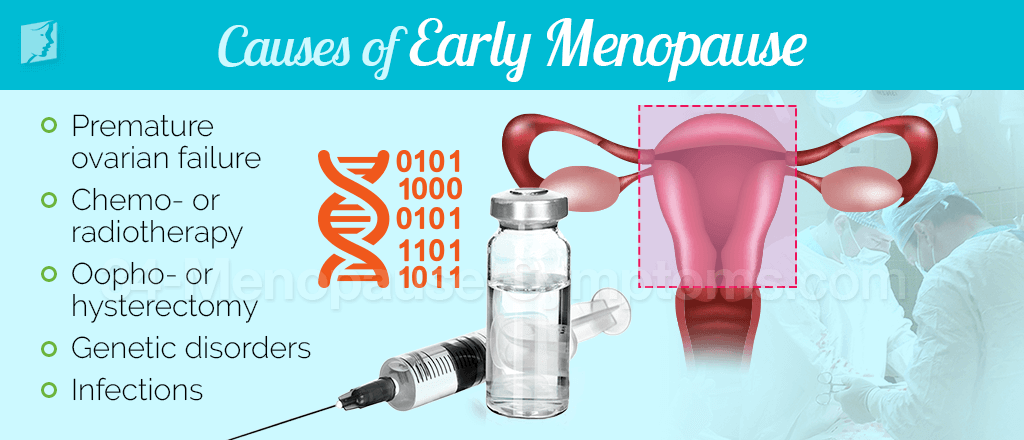
Even though the triggers mentioned above are the most common, other contributing factors should be taken into consideration when trying to pinpoint the causes of early menopause in your case.
Click on the following to read more information about early menopause causes, or continue reading to learn about early menopause signs and symptoms.
Early Menopause Symptoms
Women before 40 usually take some time to identify their symptoms as menopausal, since they appear at such an early age. Early menopause symptoms, like typical menopause symptoms, are due to hormone fluctuations. However, these symptoms can also be related to other health conditions. The following list mentions the most common symptoms of early menopause:
Common Signs and Symptoms of Early Menopause
- Vaginal dryness
- Bladder irritability
- Hot flashes
- Irregular periods
- Emotional changes
- Dry skin, eyes, or mouth
- Insomnia
- Decreased libido
Identifying the symptoms is essential, since they could also be indicative of serious diseases or health conditions.
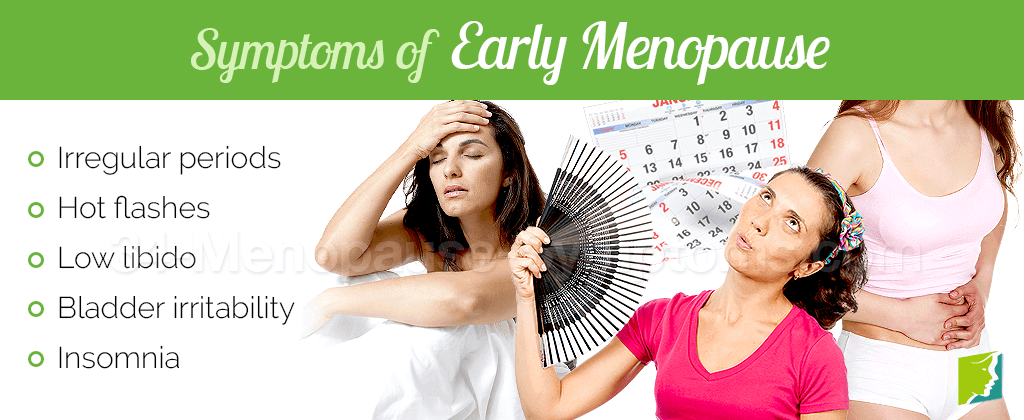
Click on the following link for a complete list of early menopause signs and symptoms, or keep reading to learn about early menopause symptom treatments.
Early Menopause Treatments
When women are diagnosed with premature or early menopause, they have to deal with both physical and emotional changes. Fortunately, there are many ways to decrease the duration and severity of early menopause symptoms.
These early or premature menopause treatments are: including lifestyle changes, alternative medicine, and prescribed medications. Learn more about the different benefits and risks of each treatment option.
Early Menopause Tips
- Eat a balanced diet
- Get sufficient sleep
- Exercise regularly
Out of the three approaches, lifestyle changes carry the least risk. However, they entail major commitment and discipline. Techniques such as massage, yoga, or meditation are known to help women regain control of their bodies and minds. Despite such benefits, bear in mind that those techniques do not address the problem at its source.
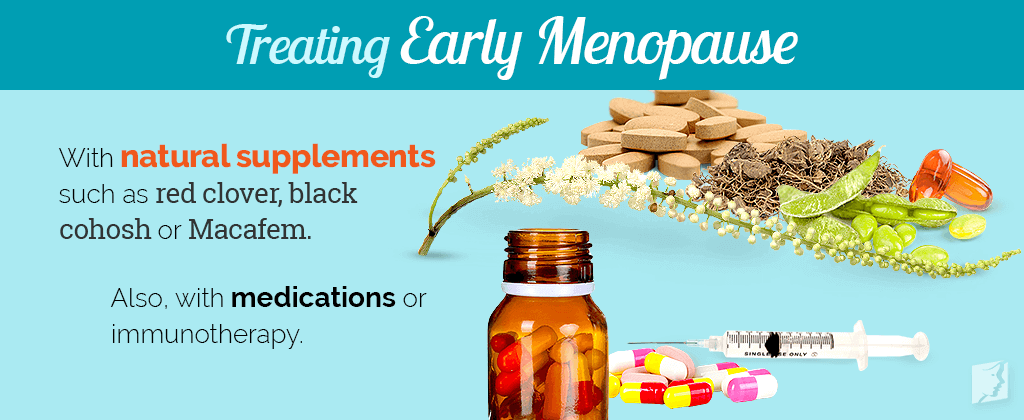

The second approach, alternative medicine, entails the use of certain herbs to alleviate symptoms. Natural and alternative remedies have been widely recognized to relieve early menopause symptoms. This approach can be very effective for many women. For some women, however, they may need more powerful treatments to alleviate their symptoms. If this happens, medications will likely be their best option.
The third approach refers to the use of prescribed medications. Among the possibilities, hormone replacement therapy (HRT) is the most popular one. Unfortunately, HRT has been linked to serious health conditions, such as an increased risk of developing different types of cancer and heart disease.
Learn more about the different ways to find relief from early menopause symptoms in early menopause treatments.
Sources
- Love, S. (2003). Menopause and Hormone Book. New York: Three Rivers Press.
- Office on Women's Health. (2010). Early menopause (premature menopause). Retrieved April 4, 2016, from http://womenshealth.gov/menopause/early-premature-menopause/
- Visvanathan, N. & Wyshak, G. (2000). Tubal ligation, menstrual changes, and menopausal symptoms. Journal of Women's Health & Gender-based Medicine, 9(5), 521-527. Retrieved from http://www.ncbi.nlm.nih.gov/pubmed/10883944

